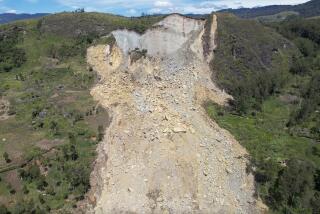Foreign Rescue Teams Begin Leaving Armenia : Hope Seen as All but Gone; Phased Demolition of Worst-Hit Areas to Begin
MOSCOW — The foreign rescue teams that have led the search for survivors of the devastating Armenian earthquake began withdrawing Thursday, saying that hope is all but gone that more people will be found buried alive in the rubble.
At the same time, Soviet authorities ordered engineers to begin the phased demolition of the worst-hit towns, villages and neighborhoods as quick, final searches are made there for survivors.
Taken together, the moves effectively will end rescue operations this weekend, and Soviet authorities are reported to have decided to call off any searches still in progress next Tuesday, nearly two weeks after the Dec. 7 disaster.
Threat to Population
Although the Soviet health minister had declared the government’s intention Wednesday to pursue the search for survivors until every building had been checked and every mound of rubble sifted, the special commission overseeing the rescue operation decided Thursday to proceed with clearing operations.
“A new stage of the clearance of debris is approaching in which demolition workers will join,” the commission said in its nightly communique. “They are instructed to liquidate the ruins that pose a threat to the population.”
But, it added, “it is only after all the survivors and dead bodies are pulled out from under the rubble that this work will start.”
With fewer people found in recent days and with freezing weather gripping the area, “the hope of finding any more (survivors) is ending,” Julia V. Taft, director of the U.S. Foreign Disaster Assistance Office, told reporters in Moscow after five days in Leninakan, Armenia’s second-largest city.
“People cannot remain buried for very long periods of time under rubble, particularly as it has been very cold,” Taft said. “At some point you have to stop.”
Only one person was found alive Thursday, according to the official Soviet news agency Tass, but 509 bodies were pulled out of the buildings.
To continue the search would give false hopes to surviving family members, Taft said. Just as the initial search, however futile, was important to reassure family members that everything was being done to find their loved ones, it is also important to end the search when there is no further hope, she added.
Teams from Britain, Czechoslovakia, France, Italy and Switzerland already had pulled out before the 45-member U.S. group, which is scheduled to return to Yerevan, the Armenian capital, today and to leave for the United States on Saturday. Only Austrian, Canadian and Dutch teams are expected to continue the search past the weekend.
The dogs with which the American and other teams were working had become exhausted, Taft said, and were having increasing difficulty locating survivors.
Small-scale demolitions began Thursday in Spitak, the hardest-hit town, according to Western reporters admitted to the area, and bulldozers cleared some areas of Leninakan.
‘Hopes Become Smaller’
“The search continues for survivors, but with the lapse of time, hopes become smaller and smaller,” Foreign Ministry spokesman Gennady I. Gerasimov said in Moscow. “They will continue searching for people while the smallest hope remains of finding anyone alive.
“If a day or two ago we found 20 people alive, why shouldn’t we search some more? We might find others; we hope we will.”
Soviet authorities reported late Thursday that they had recovered and buried 22,312 bodies. The official death estimate, however, remains 55,000, while unofficial estimates reach as high as 100,000.
At the same time, the special commission of the Communist Party’s ruling Politburo ordered officials to step up the evacuation of children, their mothers and the elderly from the region. Only the able-bodied should remain to participate in reconstruction efforts, the commission said. About 500,000 of the region’s 700,000 people are believed to be homeless.
Security forces, meanwhile, cracked down on looters who were plundering abandoned shops and homes of the earthquake region and stealing some of the relief supplies that have flowed into Yerevan from the Soviet Union and 67 countries worldwide.
“We should not conceal the fact that all kinds of scum are coming to the places of tragedy in search of easy profit,” Lt. Gen. Vladimir Dubinyak, the chief of staff of the Soviet Interior Ministry’s troops, told the Communist Party newspaper Pravda.
Nearly 200 people were arrested by police and soldiers on duty in the earthquake zone on charges of looting, according to Tass.
In Kirovakan, a man was arrested for stripping watches, earrings and other jewelry from dead bodies, according to Tass. One apartment was robbed of gold and electronic equipment worth $67,000, Tass said. In Leninakan, sales personnel in a gift shop were arrested on charges of stealing gold jewelry worth more than $85,000. Furs and jackets were stolen from a clothing factory in Spitak.
Altogether, goods worth more than $424,000 had been confiscated from the looters, Dubinyak said, but more than $13 million in cash had been found and turned in to police by honest citizens.
The earthquake region has been placed under military control, troops are patrolling the towns and villages and curfews are in force to prevent further looting.
Soviet authorities also said that renewed ethnic unrest is hampering the rescue and relief operations.
More to Read
Sign up for Essential California
The most important California stories and recommendations in your inbox every morning.
You may occasionally receive promotional content from the Los Angeles Times.










